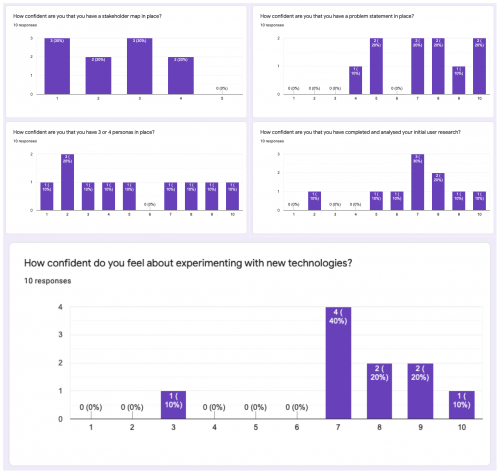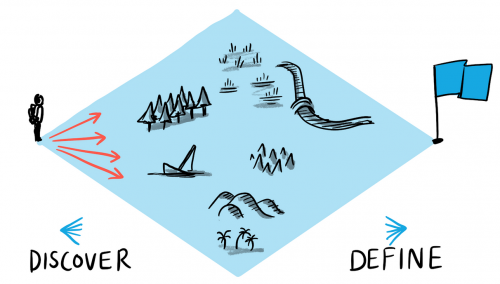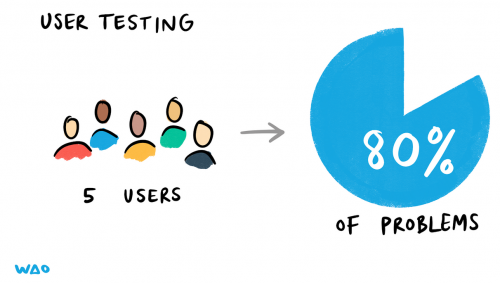cross-posted on We Are Open Co-op blog
Weeknote Feb 15–19
Here’s another weeknote focussed on the Catalyst Definition Programme! I’m focusing on this specifically to help model the behavior of writing weeknotes for my cohort. Also, I’m spending a lot of time on this programme, so ¯\_(ツ)_/¯
Data is Biased
On Monday I geared up for our official Kickoff call, and sent everyone a reminder. This included the ask that each charity fill out an initial questionnaire to help us further understand what assets charities are coming to the programme with.

At first, I was a bit surprised by the wide range of answers. To be honest, we didn’t bother thinking about how we might make our data bias. Data can become corrupted based on choices you make when putting your questions together. Our results would be different if we had used a 5 point or 7 point Likert Scale. They would have been different if we had really *thought* about phrasings. For example, we asked if people were confident that they had “3-4” personas developed. If someone had 2 well developed ones, they still would have answered that they aren’t confident, so this might have made our overall results have a larger spread than necessary. However, we just wanted a quick gut check, and the questionnaire worked just fine for that.
The Map is the Metaphor

On Tuesday, we ran our Kickoff call as well as small group sessions. We introduced ourselves, introduced OWL support and provided an overview of what they can expect.
Bryan used illustrations and narrative to talk about the story so far — from the Discovery phase and into the Definition phase. Then I walked everyone through our Notion page, which is our canonical link for this project, and talked about our overarching ambition, which I see as “mapping”.
Before we find solutions, we need to map the landscape of the problem and the people of the land. Maybe it sounds silly, but I really think “the map is the metaphor” for a Definition phase (aka Concept Phase). There are all these contingencies when it comes to digital transformation and building software. A proper technologist builds technology IN CONTEXT.
Please hold for a small rant

I believe that responsible technology is a result of thinking about wtf you’re doing. Not experimenting on your users, but experimenting with them. Understanding how a decision here will affect a person over there. I do not believe in rushing to market. I do not believe it’s a good idea to “go fast and break things”*. I believe that some technologists do not do their due diligence, and they wield their power irresponsibly.
I believe that a measured approach and contextual decision making is what will make the world a better place. It doesn’t mean that I move slowly. It means that I do my best to look at the *context* of an organization, a project or a programme, before defining a solution. It means that I take small, measured steps to map (define) context, and I work to ensure that what we do has real, positive impact.
*This entire paragraph is a dig on Facebook
Stakeholder Mapping

This week, we began that mapping in the small group sessions when we explained an easy way to do Stakeholder Mapping. Stakeholder Maps are the first tool that seems simplistic, but is massively powerful. Stakeholder Mapping can reveal invisible power dynamics that will affect your project or organization, and it can help you manage those dynamics.
Here’s a video explaining the process.
User Centric Processes
Later in the week we did a Audience Analysis session, wherein we talked about data and tools. We messed around with Google Analytics, explained that Data Studio sounds scary, but is really just a dashboard, and walked everyone through the basics of sorting data. We didn’t talk much about data bias in the Thursday session, but we did talk about how we can use data to tell stories.
Our final offering for the week has our “users” (e.g. our charity reps) in mind — simple, freeform office hours. We are saving some time for charities to come and talk with us about their specific issues. This first week we have no booking system, we’re just going to hang around in Zoom and see what happens. We’ll continue to adjust the programme and our offerings as we get to know our cohort.
Coming Up
Next week, we’re going to dive into Architecture of Participation and help charities understand how the methodology can be applied to their contexts.